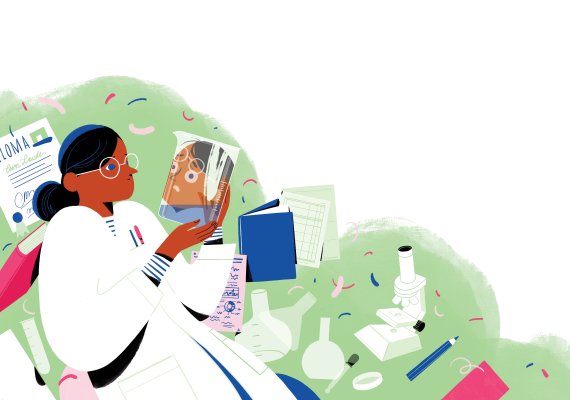The feeling that you have no idea what you are doing, while your colleagues seem to be sailing effortlessly through their doctoral research.
A lot of PhD students feel just like Frank Abagnale Jr. in the film Catch me if you can: scare of being exposed as a fraud. They think other people overestimate their abilities and don’t believe they are capable enough. Yet, unlike the ultimate con man Frank Abagnale Jr., they do have the right education and background knowledge. Wageningen PhD students suffer from imposter syndrome too. Resource talked to 32 PhD students, and 19 of them said they have experienced imposter syndrome. One of these is Katrin Heidemeyer, a third-year PhD student in the Biochemistry chair group. Although she knows a lot about her subject, in her own eyes her knowledge is only basic and others know a lot more. ‘I feel like everyone sees the shortcomings in my work and thinks I don’t know anything.’
Curling-parenting
And she is not the only one. Elsbeth Kuneman has been a welfare officer at Wageningen University & Research for 20 years, and she notices that imposter syndrome is more common than it was when she first started. Kuneman thinks it is partly a generational problem affecting millennials, including the current cohort of PhD students. Among the possible reasons, she mentions the typical parenting approach experienced by this generation – ‘curling parenting’, where parents sweep difficulties and obstacles from the path ahead of their children. This prevents children from learning to deal with failure and disappointments. ‘On top of that, millennials grew up with slogans like “success is a choice” and “If you work hard enough, you’ll get there”, says Kuneman. So when they don’t succeed, they blame themselves and self-doubt can take over.
Imposter syndrome affects people in many walks of life, but the context in which PhD students find themselves can provoke an extreme form of it. Tjitske Geetsema graduated in December 2019 in the Hydrology chair group. On her MSc programme she was one of the better students: ‘There were students around me who were less able than I was. I thought: if they can do it, so can I.’ But that changed once she started her doctoral research. ‘Suddenly I was surrounded by people who were all incredibly capable. When my supervisors got into heated discussions, I kept in the background. I thought: they are sure to know far more about it than I do’. This sounds familiar to welfare officer Kuneman. ‘If you are used to standing out in the class, a new setting among people who – as you see it – are more intelligent and experienced than you can make you doubt yourself.’
Failed
For many PhD students, their research project is their first job, and that plays a role in how common this problem is. ‘PhD students concentrate far too much on their substantial results and not enough on the development and learning process,’ says Kuneman. That is all too recognizable for PhD student Heidemeyer. Three years ago, the first experiments in her research failed, contrary to her expectations. ‘For me those negative results meant I wasn’t good at my job,’ says Heidemeyer. She was so convinced about that, that she expected to be sacked after her trial period.
Something else might also underlie the high rate of imposter syndrome about PhD students: it is part of their training. Many PhD students embark on a research project out of interest in a particular field, but also because they have thus far been good at their subject. In that situation, the teacher provides the learning materials and once you have mastered the knowledge, you can get a good grade in the exam. It’s all quite different when you do research. Now, nobody tells you what you should learn, and no one knows the answers to your research questions. It is up to the PhD student to figure that out. So doctoral research confronts you with what you don’t know, and precisely for that reason many people start doubting their own abilities.
For me, negative results meant I was not good at my job
Imposter syndrome should not be confused with fear of failure, though. ‘A particular hurdle that someone finds difficult, such as a test, invokes fear of failure,’ explains Kuneman. So fear of failure is directly related to an event. ‘With imposter syndrome, that is not the case. It is a state of mind.’
The importance of doubt
Imposter syndrome can have a number of consequences. PhD student Geertseman worked long hours in an effort to prove herself, but that stressed her out. She was also too critical of her results, causing her to doubt them as well as her own abilities. Keeping up appearances over a long time is very draining and undermining, as social worker Kuneman has seen. Besides the stress and work pressure it creates, keeping up appearances also reduces people’s interest in social activities, and causes sleep problems. Not getting enough sleep reduces concentration levels and effectiveness, and feeds self-doubt. In short: it is a vicious circle that is not easy to break out of.
And yet imposter syndrome doesn’t have to be all negative. Professor of Environmental Policy Simon Bush tries to make imposter syndrome work in his favour and get the best out of it (see inset). Professor Martin Schwarz goes so far as to emphasize the importance of self-doubt and ‘stupidity’ in the sciences. He wrote in the Journal of Cell Science: ‘The more comfortable we become with being stupid, the deeper we will wade into the unknown and the more likely we are to make big discoveries.’
Talking
Talking could well be the solution. ‘When you talk about it, you bring the problem into the light of day and you can’t act as though it didn’t exist anymore,’ explains Kuneman. Heidemeyer discussed her doubts with her colleagues, partner, friends and supervisor. ‘The conversation with my colleagues was very useful for me,’ she says. ‘They go through the same difficulties and can genuinely empathize.’ Kuneman stresses that there is no one right person to talk about it with: ‘It might be a company welfare officer, but it doesn’t have to be. You need to talk about this with someone you feel able to be open with about your vulnerabilities.’
Unlike Heidemeyer, Geertseman hasn’t talked about her imposter syndrome with anyone before. But in her new job as a researcher and advisor at Deltares, it is not so much of a problem. One big difference is that she is working in a team in her new job. ‘As soon as I start working in team, and there is consultation, I am less insecure,’ says Geertsema. So imposter syndrome can spontaneously ebb away as you gain more experience, or when you switch to a new work situation.
#imposteratWURk
Could WUR do more to help? Nowadays, Heidemeyer feels less of an imposter, because she notices that many of her colleagues struggle with the same imposter syndrome. ‘For that reason, a course or lecture about imposter syndrome should be compulsory for every new PhD student,’ says Heidemeyer. ‘The graduate schools could integrate that into the introduction day, for instance.’
Welfare officer Kuneman would love to see more attention being paid to the development of PhD students, alongside the standard R&O discussion, and separate from substantial matters of planning and results. ‘If PhD students and their supervisors have a really good talk about how things are going on the emotional level, you can catch a lot of problems early, including imposter syndrome,’ says Kuneman.
So it is not uncommon among PhD students to feel that you are not as smart or able as the others around you. Maybe more openness about imposter syndrome on the workfloor – or in corona times via social media (imposteratWURk) could help ensure that in a few years, fewer PhD students feel like Frank Abagnale JR, and more PhD students enter the aula to defend their thesis bursting with confidence.
Two professors talk about their own road to success
Simon Bush is chair-holding professor in the Environmental Policy chair group. Even he experiences imposter syndrome and sometimes thinks: ‘Who am I to say anything about this or to decide?’
I have experienced imposter syndrome quite regularly during my career, and it comes back again sometimes even now. It is a natural reaction when I face new challenges. So I don’t see imposter syndrome as something negative in itself. I think it is very healthy to regularly reflect on your work and the situation you are in – particularly if you want to go on growing. The way I see it, self-doubt is a normal part of professional life. It’s good to realize you are not the only person who feels this way: a large majority of the people around you are in the same boat. I make that clear to my PhD students too. I explain to them that doctoral research is an exercise in self-doubt and that we train them to deal with this kind of insecurity and to embrace it.’
John van der Oost is personal professor of Microbiology. He is one of the masterminds behind the CRISPR-Cas technique, for which he won the Spinoza Prize in 2018.
‘This is the first time I’ve heard of the imposter syndrome. Looking back on my own PhD research and career, I can only feel satisfaction. Did I never doubt myself? Of course I did. My career has been a long and winding road, with ups and downs. When an experiment failed, I tried not to dwell on it for too long, but went in search of a solution. What got me where I am was a combination of curiosity, willpower, collaboration, perseverance, following my heart, the odd good idea and a lot of luck. Not to mention a lot fun as well. I often say to my PhD students that they need the mentality of an icebreaker: keep trying to force a breakthrough, but if the ice is too thick in one place, you have to look for another place where it will be possible. The moral of the story: you don’t need a cum laude to win a Spinoza Prize.’

 llustration: Steffie Padmos.
llustration: Steffie Padmos. 

